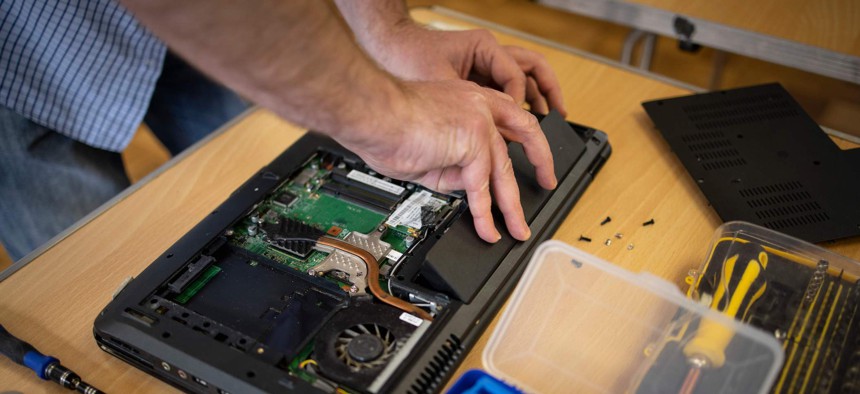Connecting state and local government leaders
Minnesota is the fourth state to require manufacturers to share parts and repair information with equipment owners and independent shops to more easily fix devices like phones, laptops and appliances.
This story was first published by Stateline. Read the original article here.
Do-it-yourselfers and repair shops are celebrating a victory in Minnesota with the enactment of a new law that requires many manufacturers to share parts and information with tinkerers and small businesses.
The so-called right to repair law will allow equipment owners and independent shops to more easily fix devices like phones, laptops, appliances and other equipment.
Minnesota is the latest state to approve such a law, following Colorado earlier this year and New York last year. Massachusetts’ law covering vehicles was enacted in 2020. Do-it-yourselfers, farmers, handyman companies and small repair shops argue that without such laws, big tech companies make it almost impossible to get manufacturers’ parts and instructions.
Manufacturers, however, argue that broadening access could pose dangers to would-be repairers and the equipment as well as compromise the safety and security of devices.
As the bills make their way through the states, tech firms have successfully lobbied to exempt some types of equipment or allow other exceptions such as allowing manufacturers to provide only full assemblies of parts, rather than individual parts such as a chip, for what the manufacturers say is safety or security reasons.
Colorado’s law, for example, only applies to powered wheelchairs and farm equipment, while Massachusetts’ law covers vehicles. New York enacted a relatively broad electronics bill last December.
The Minnesota law, signed by Democratic Gov. Tim Walz last week as part of the state budget, requires manufacturers of electronic devices such as phones, tablets, laptops and household appliances to provide parts, tools and instructions on how to fix equipment to independent repair shops and consumers.
But lawmakers removed farm equipment, video game consoles, specialized cybersecurity tools, medical devices and vehicles from the bill before it was approved.
Despite those carve-outs, repair advocates say Minnesota’s law is the most extensive one yet. New York’s version, for example, excludes any “product sold under a specific business-to-government or business-to-business contract … not otherwise offered for sale directly by a retail seller.” That could cover school computers.
And New York’s measure only applies to products made after July 1, 2023, which excludes most products currently in use.
Nathan Proctor, senior director for U.S. PIRG’s Right to Repair campaign, cheered the Minnesota law, saying it will “cut waste and save consumers money. It’s common sense, and it is becoming increasingly clear that manufacturers’ attempts to thwart repair will no longer be tolerated. Minnesota won’t be the last state to codify that,” Proctor said.
Proctor acknowledged that manufacturers probably would like to have uniform laws across the states, but he blamed them for creating the patchwork by lobbying in statehouses for the exclusion of specific industries and products.
“We’re willing to negotiate and talk about how to get this done with lawmakers and industry people,” Proctor said in an interview. “We go to them and say what you did to us in New York means we have to pass multiple [state] bills.”
In New York, the legislature last year overwhelmingly approved a broad right to repair measure. But Democratic Gov. Kathy Hochul successfully pushed for modifications after the CTIA, a trade group for the communications industry, asked her to veto the bill because, the group argued, it “has the potential to weaken the privacy and security features of electronic products.” Those changes eliminated a requirement that manufacturers provide passwords, security codes or materials to override security features on devices, as well as the ability to provide multiple-part assemblies rather than individual parts.
Similarly, opponents of the Minnesota legislation argued that forcing manufacturers to provide parts and manuals to independent operators could drive up prices and compromise safety and data privacy.
Asked by Stateline to comment on the new Minnesota law, CTIA spokesperson Caitlin Miller said by email that the organization “won’t have a comment.”
Last year, President Joe Biden issued an executive order calling on federal agencies to limit manufacturers’ attempts to bar self-repairs or third-party repairs of government-owned devices. Congress so far has failed to act on a federal right to repair measure.
But the pressure has had an impact on some manufacturers. Apple and Samsung recently expanded the number of devices they include in the self-repair instructions they provide to the public. The companies did not respond to Stateline requests for comment on the Minnesota law.
According to PIRG, which keeps track of state legislation, lawmakers in 29 states introduced right to repair bills in 2023. Some have made progress.
In California, for example, a Senate committee earlier this month approved a bill that covers electronics and appliances, but not alarm systems or video consoles. And in Vermont, a bill that would apply to agricultural equipment has passed the House, but the legislature recessed for the year before it could be taken up in the Senate. It is still alive for next year, as Vermont has a two-year session.
Louis Rossmann, owner of Rossmann Repair Group in Austin, Texas, has garnered tens of thousands of views for a YouTube video he posted to celebrate enactment of the Minnesota law. Rossmann called on manufacturers to stop lobbying for exemptions, saying they lead to “a more confusing patchwork of legislation to deal with across the country.”

NEXT STORY: Officials Say They've Fixed a 'Sorting' Breakdown in Virginia Booze Raffle



